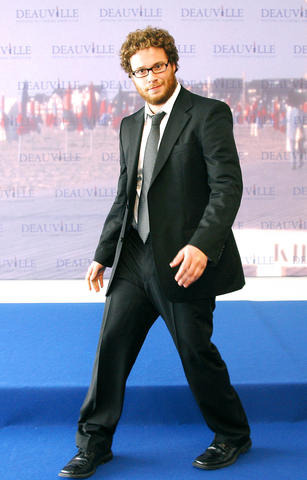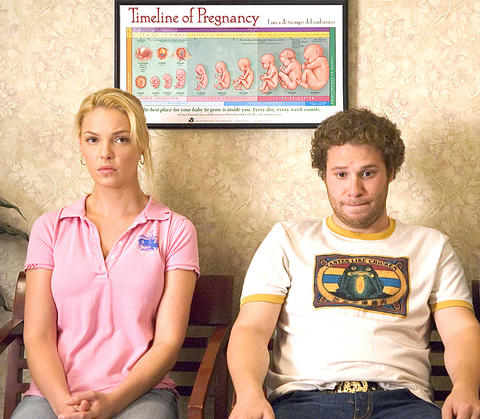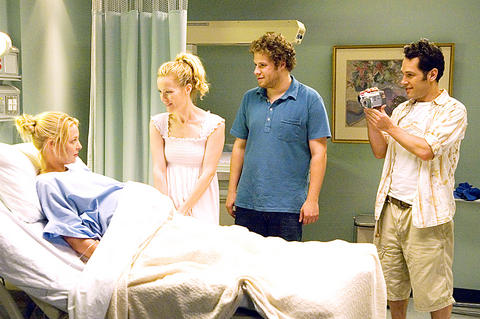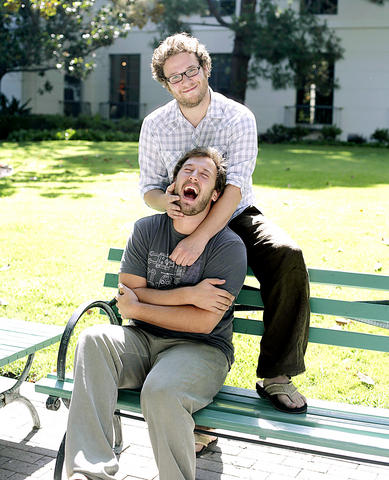he wrote as an antidote to 'Beverly Hills 90210'
The king of the summer box office arrives unaccompanied and draws no crowd as he settles into a booth in a West Hollywood coffee shop. Unlike many past holders of his title, he's not swooningly handsome, blue-eyed or flaxen-haired. He's about 180cm tall, big and burly, with red, slightly frizzy hair, big glasses and a very infectious, dirty gurgle of a laugh, which will be heard often over the next hour or so, along with a blizzard of profanity and one-liners.
Hard to believe, but Seth Rogen starred in two hugely successful comedies this summer that may have shifted the center of gravity of American comedy: Knocked Up (on general release in Taiwan) and Superbad (due for release in Taiwan on Nov. 2 and still roosting at number three in the US charts). Rogen, his childhood friend and writing partner Evan Goldberg, and their director/friend/mentor Judd Apatow (The 40 Year Old Virgin) have book-ended the summer season with two marvelously fresh and foul-mouthed, yet surprisingly wise and sweet-natured comedies about losers, sex, marriage, the Darwinian principles of high school, losing one's virginity, shooting up cop cars and snagging beer with fake IDs. Somewhere in the upper echelons of the Hollywood comedy scene, an older generation is nervously looking far below itself and seeing its own replacements.
Rogen is just back from a European press tour on which he and his friends were treated like rock stars, thanks to the two movies' near simultaneous release in overseas markets. He also encountered one of his American comedy forebears.

PHOTO: AGENCIES
"I saw Woody Allen in Paris last week, being followed by like, two dozen paparazzi. And it's weird seeing a really old man being followed by paparazzi. You always expect to see Lindsay Lohan, but this was like your grandpa walking down the street. He looks like a little old man - one gust could do him in. He's frail as frail can be!" Allen is shuffling off the stage just as Rogen moves front and center. Although we roll our eyes at the stale and repetitive nature of most of Allen's recent work, we also marvel at the notion of the 15-year-old Allen as a boy-genius lead joke writer on Sid Caeser's Your Show of Shows back in 1950. Rogen got almost as early a start in comedy as Allen, having been spotted in 1998 - aged 16 and as beefy as Allen is weedy - at an open casting call in his native Vancouver, and soon after finding himself cast by producer Judd Apatow in the fondly-remembered TV high school drama series Freaks and Geeks. It was cruelly canceled after a single season but introduced him, and us, to the informal family of misshapen jokesters, comedians, writers and friends who are currently set to assume the mantle of the coming generation in Hollywood comedy.
He subsisted on the usual acting gruel of low-rank comedy figures until Knocked Up shot him into the stratosphere four months ago and Superbad sealed the deal. He's also an accomplished writer - as the Superbad script attests - and he did a stint as a joke-writer for HBO's Da Ali G Show. (Of working with Sacha Baron Cohen, he says: "We'd just write or dream up these 30 or 40 awful questions for him to ask and he'd take off to film it, leaving us horrified and thinking, 'You're actually gonna fucking do that?' People think he's a lot more heady than he is, he's just a guy who wants to make funny shit. I find him oddly easy to hang out with.")
Does being a Canadian in the US make a difference? "I think it does. You have all of the American culture already there in your head, but no loyal attachment to it, so you can make fun of it. And when you watch the news you don't think, 'Man we're fucked!' You think, 'Man, they're fucked!' It's great, like there's an automatic fake moral high ground that's just built in to whichever situation you're in."

PHOTO: AGENCIES
Foreignness brings with it other perspectives not normally associated with American comedy. His parents are, he says, radical Jewish socialists. "Well, they're socialists, maybe not that radical, and they met on a kibbutz in Israel. My mom's a social worker and my dad works in non-profit organizations. But they seem very radical in American terms, embracing a form of socialism that really doesn't even exist here. I mean, where I come from, communism is not a terrible word."
Superbad also has something of an outsider's sense of place. Rogen and Goldberg wrote the first draft of the script when they were both in high school, and polished it to a high sheen over the next 12 years. It stemmed from never recognizing themselves in high-school movies or TV shows and from a desire to get things right that those shows had got sadly wrong. They saw trailers for American Pie and worried briefly that someone might have beaten them to it. "But then we saw it and went, 'Cool, they've managed to totally avoid all honest interaction between characters,' which is what we're going for."
For their comedy about two graduating virgins - one angry and fat, based on Rogen and played by Jonah Hill, and the other slight and sweet, based on Goldberg and played by Arrested Development's Michael Cera - the writers were interested in "how the characters relate to each other, not even emotionally, just casually." Indeed, one of the most shocking things about Superbad is how edgy, accurate and tender-hearted it is on the fragile nature of teenage male friendship, riven as it is with homoerotic ambiguity and the fear of separation. "It shocks me that 90210 and Superbad are technically considered part of the same genre. It was as much TV shows as movies that made us feel under-represented. No part of me watched 90210 and thought, 'Yeah! that's what my life is like!' It seemed like a different planet. I mean, I like shitty movies as much as the next guy, I'm not a snob, but things like that had no guys like us in it - that was the point."

PHOTO: AGENCIES
Rogen now has five movies in the pipeline, some of them leftover voice work he snagged before this summer turned his life upside-down, but also another, Pineapple Express, based on a Rogen-Goldberg script and directed by ... "Why, indie darling David Gordon Green, of course!" laughs Rogen. The man who gave us All the Real Girls and George Washington has helmed their script about a sour pothead (Rogen) and his overfriendly dealer (Freaks/Spiderman alumnus James Franco) who go on the run after witnessing a murder. A super-violent action-movie-cum-pothead-comedy by an art-house director? "I know! When I watch it I just think, 'I can't believe they let us make this!' I can't believe people actually like it, too."
The Apatow-Rogen comedy machine is so backed up, however, that Pineapple Express, though complete, won't be seen until next summer. As a teaser, Rogen leaves me with one nugget: "I guess what Judd Apatow is to me, is what Terrence Malick is to David Gordon Green. They're just good friends. And David said to me the other day, 'Guess what Terrence Malick's favorite movie of the last 10 years is?'"
What?

PHOTO: AGENCIES
"Zoolander! He knows every word, watches it every week. Which just goes to show, you never can predict these things." Rogen shakes hands, says goodbye and walks out into the ever-brightening limelight.

June 9 to June 15 A photo of two men riding trendy high-wheel Penny-Farthing bicycles past a Qing Dynasty gate aptly captures the essence of Taipei in 1897 — a newly colonized city on the cusp of great change. The Japanese began making significant modifications to the cityscape in 1899, tearing down Qing-era structures, widening boulevards and installing Western-style infrastructure and buildings. The photographer, Minosuke Imamura, only spent a year in Taiwan as a cartographer for the governor-general’s office, but he left behind a treasure trove of 130 images showing life at the onset of Japanese rule, spanning July 1897 to

In an interview posted online by United Daily News (UDN) on May 26, current Chinese Nationalist Party (KMT) Chairman Eric Chu (朱立倫) was asked about Taichung Mayor Lu Shiow-yen (盧秀燕) replacing him as party chair. Though not yet officially running, by the customs of Taiwan politics, Lu has been signalling she is both running for party chair and to be the party’s 2028 presidential candidate. She told an international media outlet that she was considering a run. She also gave a speech in Keelung on national priorities and foreign affairs. For details, see the May 23 edition of this column,

The Taiwan People’s Party (TPP) on May 18 held a rally in Taichung to mark the anniversary of President William Lai’s (賴清德) inauguration on May 20. The title of the rally could be loosely translated to “May 18 recall fraudulent goods” (518退貨ㄌㄨㄚˋ!). Unlike in English, where the terms are the same, “recall” (退貨) in this context refers to product recalls due to damaged, defective or fraudulent merchandise, not the political recalls (罷免) currently dominating the headlines. I attended the rally to determine if the impression was correct that the TPP under party Chairman Huang Kuo-Chang (黃國昌) had little of a

At Computex 2025, Nvidia CEO Jensen Huang (黃仁勳) urged the government to subsidize AI. “All schools in Taiwan must integrate AI into their curricula,” he declared. A few months earlier, he said, “If I were a student today, I’d immediately start using tools like ChatGPT, Gemini Pro and Grok to learn, write and accelerate my thinking.” Huang sees the AI-bullet train leaving the station. And as one of its drivers, he’s worried about youth not getting on board — bad for their careers, and bad for his workforce. As a semiconductor supply-chain powerhouse and AI hub wannabe, Taiwan is seeing